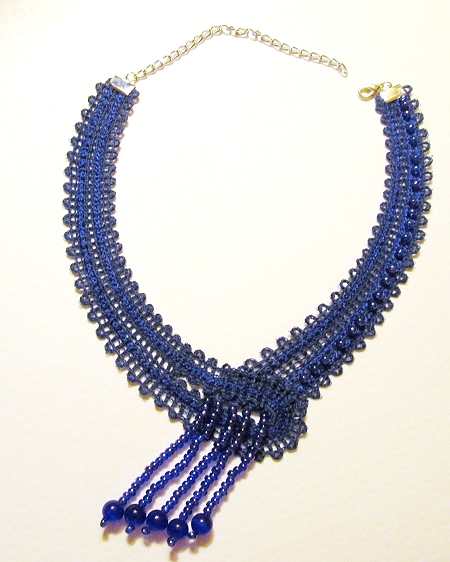
These are instructions on how to embroider the FSL Art Deco Necklace.

Stabilizers: We recommend to use water-soluble mesh, such as Vilene. Vilene D0102 is a non-woven dissolvable stabilizer which is imported into the US, is sold in large rolls and is sometimes packaged under different brand names. Some of these brand names are Fabri-Solvy by Sulky, Avalon Plus by Madeira, Wash-Away, and Aqua Magic.
Film-like water soluble stabilizers, such as Solvy by Sulky, Avalon by Madeira and Badge Master are not suitable for Free-Standing Lace embroidery.
Threads: The thinner the thread, the finer the final product will be. That is why for this project we recommend machine quilting cotton thread, which gives bulk to the lace and makes it look hand-made.
Embroidery polyester thread will make very fine web-like lace.
Embroidery rayon thread is too soft, it does not keep its shape and often its color will fades under the influence of chemicals from the water-soluble mesh.
You can use 40-, 50- or even 60-weight cotton, you can use it both in the bobbin and in the needle. If you use 40-weight cotton thread for the needle, you can use 50- or 60-weight cotton in the bobbin.
We used Signature machine quilting cotton thread both in the needle and in the bobbin, but similar threads from other companies should work just as well.
The drawback of the cotton thread is lint. Please don't forget to clean the machine with a soft bruch or compressed air after each stitch-out.
To get two-sided embroidery, use threads of the same color in the needle and in the bobbin.
Needles: We use size 80/12 embroidery needles and 80/12 metallic needles. Our experience shows that cotton thread used with metallic needles gives less lint. The needles should be sharp, so it's advisable to change them often.
Most Importantly: ALWAYS make a test stitch-out and wash away the stabilizer. This helps you to select the threads, needles, stabilizers and settings of your machine correctly. It's very important to select the correct thread tension!
Rinsing away the stabilizer is an important step, because the lace can be stretched or distorted if this is done incorrectly. We recommend to use a foam board and stainless pins.
Cut away the excess stabilizer close to the stitches. Take your time and carefully pin every single loop on the lace's outer edge to the board.
Now place the board into a bowl with luke-warm water. Leave the board in the water for at least half an hour. Change the water a couple of times.
Take the board out of the water and leave to air dry. Do not unpin the lace until it's completely dry.

Making the Necklace:
Besides stabilizer and threads, you will also need some jewelry findings, such as clasps, ribbon ends, extention chain and beads to your taste.
Both parts of the necklace are in one embroidery file, which fits into 5" x 7" (130 x 180 mm) hoop.
 |
Stitches: 12847 Size: 120 mm x 165 mm Colors: 3/4 |
Embroider the designs in any color you'd like. Wash out the stabilizer and let the stitch-out dry.
Attach ribbon ends to the short ends of the stitch-outs. Attach clasp to the ribbon-ends.
Make several strings of seed beads (or buy ready ones) and sew them to the wider end of the left part. Insert the beads to the hole on the right part.

Enjoy!
Happy embroidering!